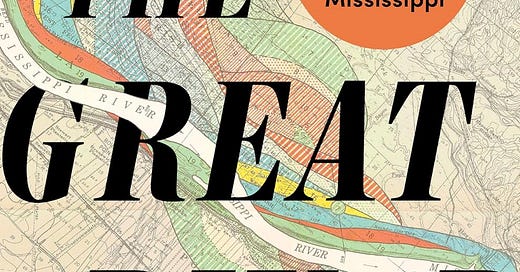Rooted Book Club: THE GREAT RIVER by Boyce Upholt
Our July 2024 Book Club Selection
Despite living for over a decade in the state that shares a name with the great river, I know admittedly little about the Mississippi itself. I have marveled at its churning, muddy waters while driving across the Harahan Bridge, from Memphis Tennessee to West Memphis, Arkansas. I have read Eudora Welty’s Some Notes on River Country and learned about The Great Flood of 1927. But for me, the river has never been a destination in and of itself. I’m ready to change that.
In his review of The Great River in the Washington Post, W. Ralph Eubanks, who himself has traveled the Mississippi by canoe, writes:
For those who have never placed a paddle in those sacred waters, reading “The Great River” is the closest thing to traveling the Mississippi and engaging with its story and its ferocity. This book tells an eloquent story of the ways the Mississippi River is a separate world, hidden in plain sight.
Let’s plunge into the waters together! Author Boyce Upholt will be joining us on Thursday July 25 at 7 p.m. CDT to discuss his book. Register now to join the live conversation.
Now, here’s the official description of The Great River:
The Mississippi River lies at the heart of America, an undeniable life force that is intertwined with the nation's culture and history. Its watershed spans almost half the country, Mark Twain's travels on the river inspired our first national literature, and jazz and blues were born in its floodplains and carried upstream.
In this landmark work of natural history, Boyce Upholt tells the epic story of this wild and unruly river, and the centuries of efforts to control it. Over thousands of years, the Mississippi watershed was home to millions of Indigenous people who regarded "the great river" with awe and respect, adorning its banks with astonishing spiritual earthworks. The river was ever-changing, and Indigenous tribes embraced and even depended on its regular flooding. But the expanse of the watershed and the rich soils of its floodplain lured European settlers and American pioneers, who had a different vision: the river was a foe to conquer.
Centuries of human attempts to own, contain, and rework the Mississippi River, from Thomas Jefferson's expansionist land hunger through today's era of environmental concern, have now transformed its landscape. Upholt reveals how an ambitious and sometimes contentious program of engineering—government-built levees, jetties, dikes, and dams—has not only damaged once-vibrant ecosystems but may not work much longer. Carrying readers along the river's last remaining backchannels, he explores how scientists are now hoping to restore what has been lost.
Rich and powerful, The Great River delivers a startling account of what happens when we try to fight against nature instead of acknowledging and embracing its power—a lesson that is all too relevant in our rapidly changing world.
Boyce Upholt is a journalist and essayist whose writing has appeared in the Atlantic, National Geographic, the Oxford American, and Virginia Quarterly Review, among other publications. He is the winner of a James Beard Award for investigative journalism, and he lives in New Orleans, Louisiana.
The Rooted Book Club is in partnership with the Mississippi Book Festival, Lemuria Books, and Friendly City Books. Red Squared records and produces our book club conversations at their podcast studio in The Hangar in Midtown, Jackson.
Have you paddled the Mississipp, or would you like to one day? What’s your connection to the river? Tell me in the comments below.





Boyce Upholt will be speaking about this book, which my husband is reading right now, at History Is Lunch this Wed., July 3. It should be good!
I recently helped out with US Fish and Wildlife Service surveys for Interior Least Terns on an 80-mile section of the Mississippi River centered on Vicksburg. I'm a Mississippi transplant, and so these two days were my first significant time spent on the river. What struck me most about the river - besides its beauty - was how every mile of it had been engineered. Levees, dikes, concrete mats, riprap, etc. - all to contain the power of the Great River. It's both impressive and act of extreme hubris. I'm glad that I had the experience before beginning Boyce Upholt's book.